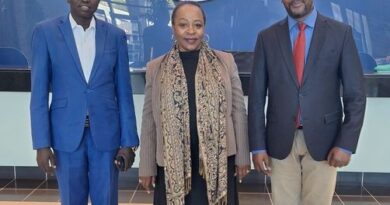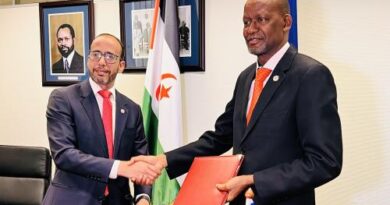SADC Health Ministers Tackle Regional Challenges in Joint Hybrid Meeting
The Southern African Development Community (SADC) Ministers of Health and Ministers responsible for HIV and AIDS convened in a joint hybrid meeting in Luanda on November 28th, 2023, to address pressing health issues affecting the region.
Chaired by the Republic of Angola, the current SADC Chairperson, the meeting focused on key concerns such as emergency disease outbreaks, Tuberculosis, Malaria, Nutrition, and HIV & AIDS.
In her opening remarks, Her Excellency Dr. Silvia Lutucuta, Minister of Health for the Republic of Angola and Chairperson of the SADC Ministerial Committee on Health, emphasized the need for coordinated multisectoral actions to address the social and environmental determinants of health.
The meeting brought together ministers or representatives from Angola, Democratic Republic of Congo, Eswatini, Lesotho, Malawi, Mozambique, Namibia, Seychelles, South Africa, United Republic of Tanzania, Zambia, and Zimbabwe.
The ministers discussed the progress and challenges in combatting Tuberculosis, with a recognition of the ongoing need for resources, qualified personnel, and diagnostic equipment to meet the goal of ending tuberculosis by 2030.
They also urged member states to utilize cross-border systems for disease surveillance and directed the SADC Secretariat to update the End Tuberculosis Strategy to align with new targets.
Addressing Malaria, the ministers endorsed the 2023 SADC Malaria Report and urged member states to strengthen interventions, improve timeliness, and expand coverage.
The designation of Zambia as the new chair of the E8 for the period 2023-2025 was also endorsed, highlighting collaborative efforts in transboundary interventions against Malaria.
On Sexual and Reproductive Health and Rights (SRHR), the ministers endorsed the 2nd SADC SRHR Milestone Scorecard for 2023. They emphasized the need to fast-track maternal mortality reduction, promote multisectoral approaches to address gender-based violence, and integrate SRHR into initiatives to combat HIV and other sexually transmitted infections.
The ministers further discussed the Regional Nutrition Report, noting progress and urging member states to implement recommendations. The rising challenges of overweight and obesity in the region prompted the endorsement of a landscape analysis report and the directive to develop a costed obesity prevention strategic plan.
In response to the prevailing challenges posed by HIV and AIDS, ministers endorsed reports on the SADC HIV and AIDS Special Fund and the Future Life Now Programme.
They emphasized the importance of mobilizing domestic resources and learning from best practices to address new HIV infections and increase antiretroviral therapy adherence among adolescents and young people.
The meeting concluded with ministers acknowledging the vulnerabilities of women and girls to HIV and AIDS, discussing the Commission on the Status of Women (CSW) Resolution 60/2, and emphasizing the need to address unequal power relations and socio-economic inequalities.
As the SADC health ministers collaboratively tackle these regional challenges, the outcomes of this meeting are expected to contribute significantly to the ongoing efforts to improve public health across Southern Africa.
Source: SADC Secretariat



